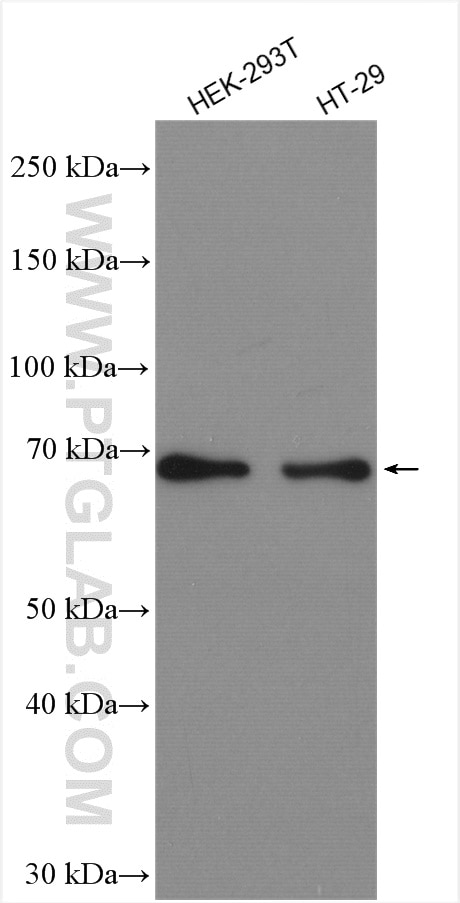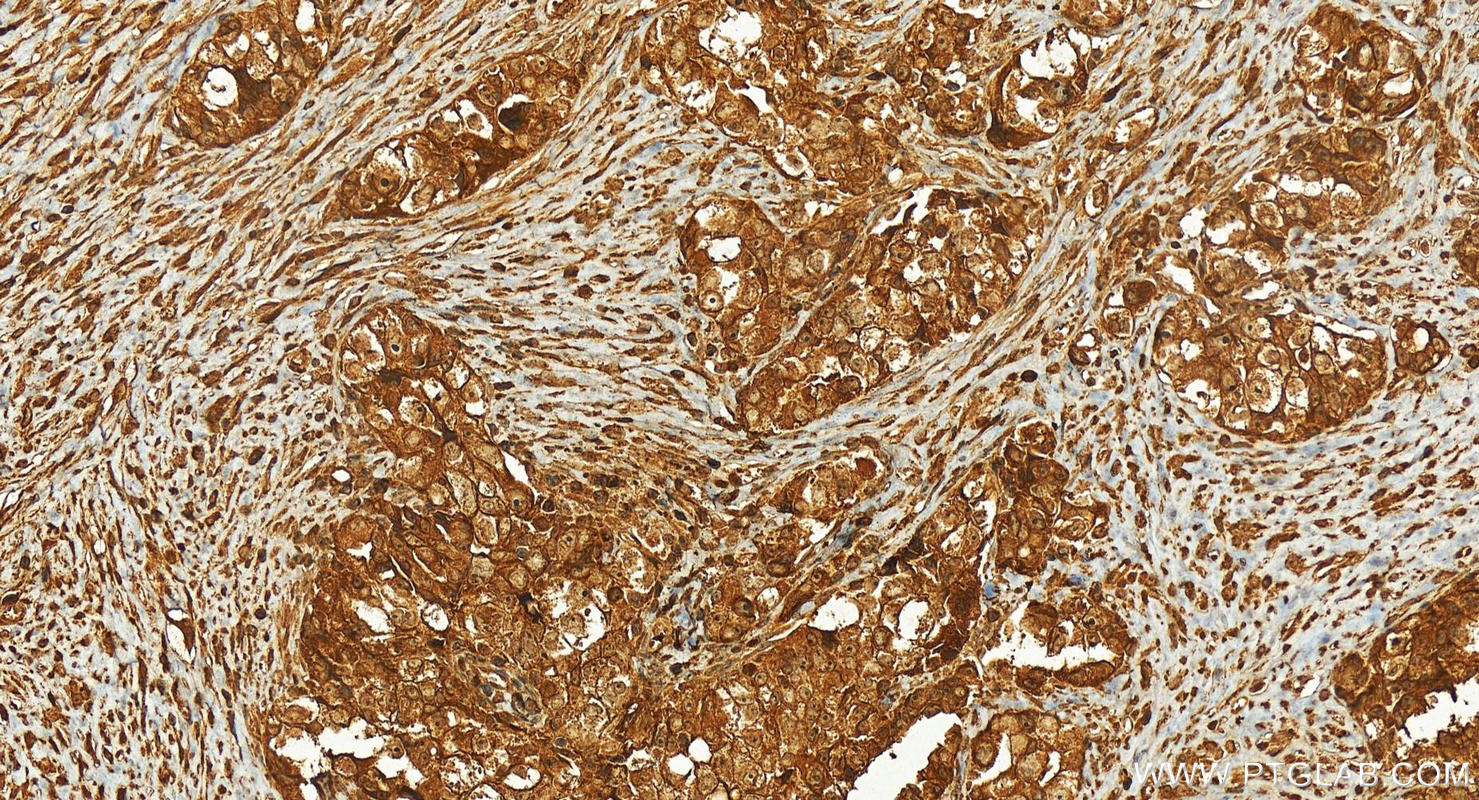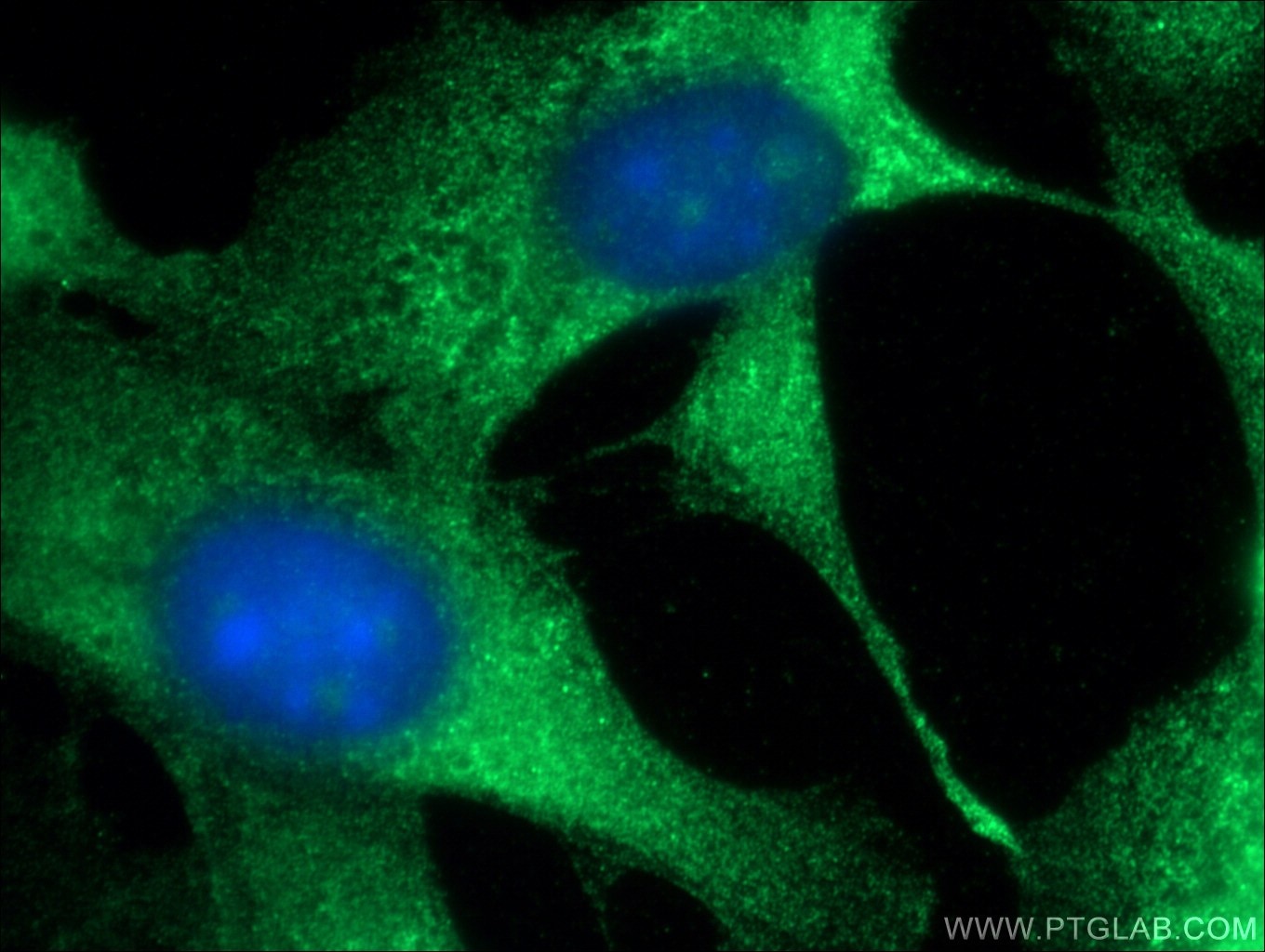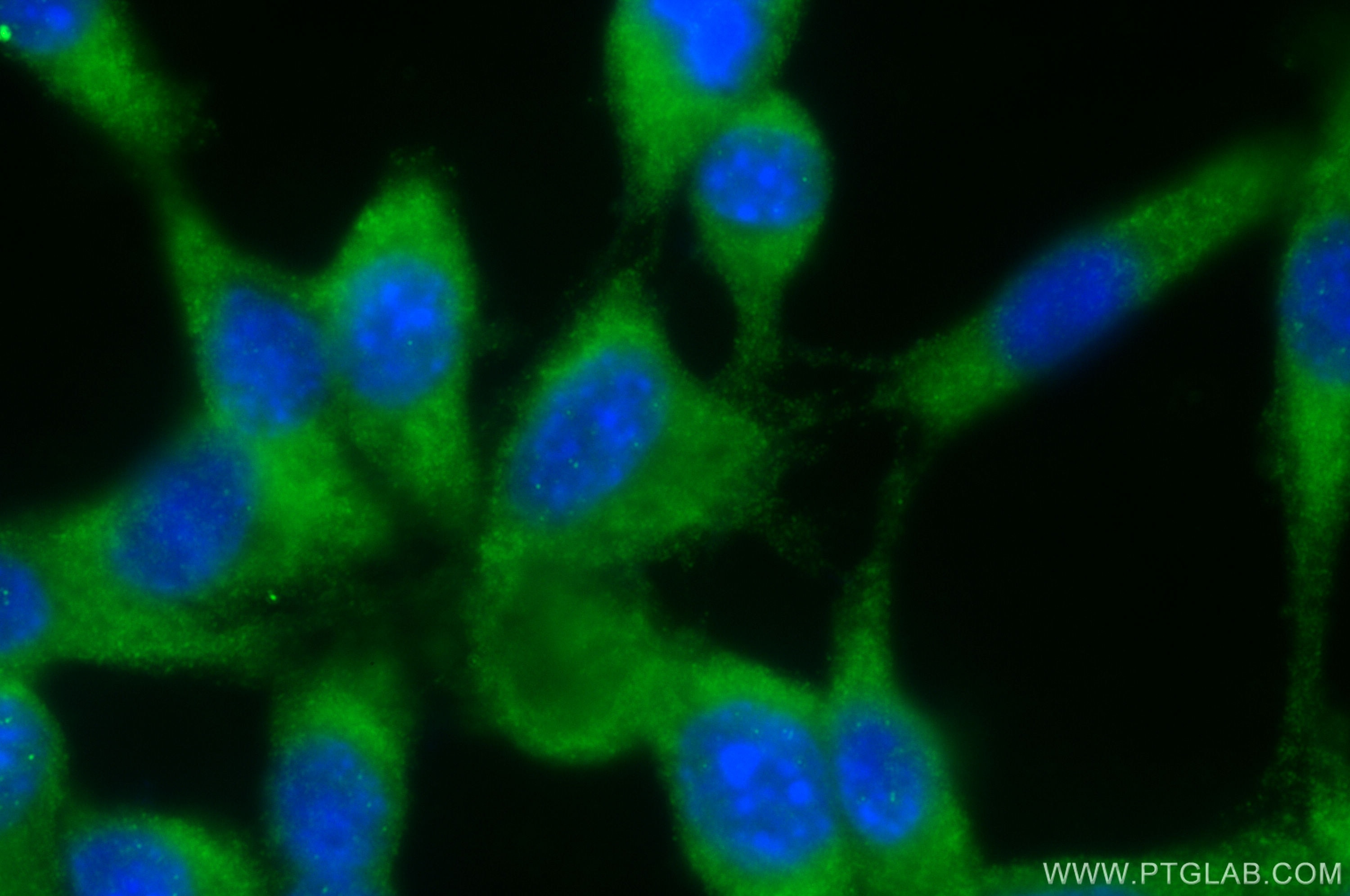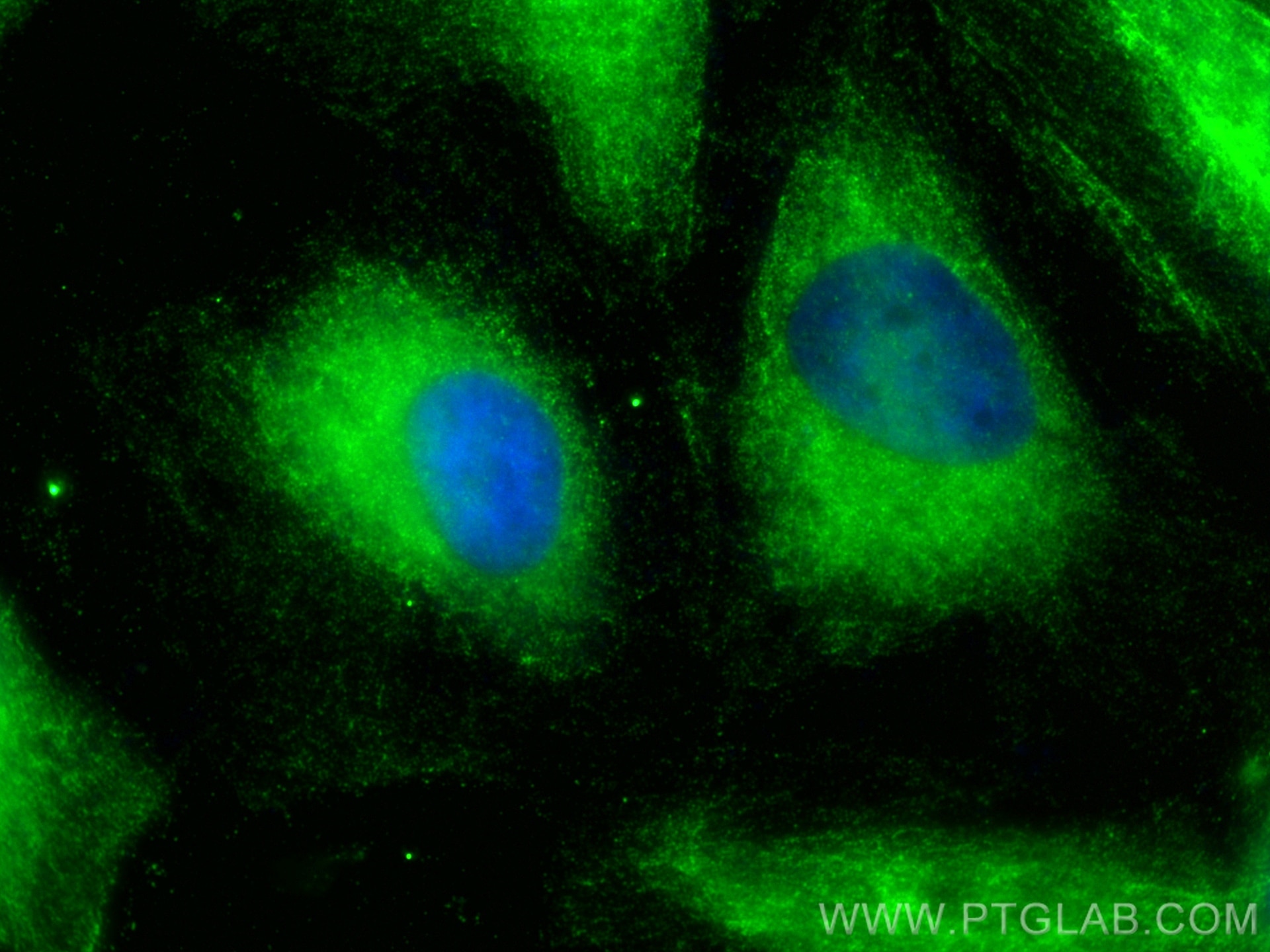Tested Applications
| Positive WB detected in | HEK-293T cells, HT-29 cells |
| Positive IHC detected in | human ovary cancer tissue Note: suggested antigen retrieval with TE buffer pH 9.0; (*) Alternatively, antigen retrieval may be performed with citrate buffer pH 6.0 |
| Positive IF/ICC detected in | HeLa cells, NIH/3T3 cells |
Recommended dilution
| Application | Dilution |
|---|---|
| Western Blot (WB) | WB : 1:1000-1:4000 |
| Immunohistochemistry (IHC) | IHC : 1:50-1:500 |
| Immunofluorescence (IF)/ICC | IF/ICC : 1:200-1:800 |
| It is recommended that this reagent should be titrated in each testing system to obtain optimal results. | |
| Sample-dependent, Check data in validation data gallery. | |
Published Applications
| KD/KO | See 1 publications below |
| WB | See 5 publications below |
| IF | See 1 publications below |
Product Information
26899-1-AP targets PKC Zeta in WB, IHC, IF/ICC, ELISA applications and shows reactivity with human, mouse samples.
| Tested Reactivity | human, mouse |
| Cited Reactivity | human, mouse |
| Host / Isotype | Rabbit / IgG |
| Class | Polyclonal |
| Type | Antibody |
| Immunogen | PKC Zeta fusion protein Ag25391 Predict reactive species |
| Full Name | protein kinase C, zeta |
| Calculated Molecular Weight | 80 kDa |
| Observed Molecular Weight | 67 kDa |
| GenBank Accession Number | BC014270 |
| Gene Symbol | PKC Zeta |
| Gene ID (NCBI) | 5590 |
| RRID | AB_2880675 |
| Conjugate | Unconjugated |
| Form | Liquid |
| Purification Method | Antigen affinity purification |
| UNIPROT ID | Q05513 |
| Storage Buffer | PBS with 0.02% sodium azide and 50% glycerol, pH 7.3. |
| Storage Conditions | Store at -20°C. Stable for one year after shipment. Aliquoting is unnecessary for -20oC storage. 20ul sizes contain 0.1% BSA. |
Background Information
Protein kinase C (PKC) zeta is a member of the PKC family of serine/threonine kinases which are involved in a variety of cellular processes such as proliferation, differentiation and secretion. Unlike the classical PKC isoenzymes which are calcium-dependent, PKC zeta exhibits a kinase activity which is independent of calcium and diacylglycerol but not of phosphatidylserine. Furthermore, it is insensitive to typical PKC inhibitors and cannot be activated by phorbol ester. Unlike the classical PKC isoenzymes, it has only a single zinc finger module. These structural and biochemical properties indicate that the zeta subspecies is related to, but distinct from other isoenzymes of PKC.
Protocols
| Product Specific Protocols | |
|---|---|
| WB protocol for PKC Zeta antibody 26899-1-AP | Download protocol |
| IHC protocol for PKC Zeta antibody 26899-1-AP | Download protocol |
| IF protocol for PKC Zeta antibody 26899-1-AP | Download protocol |
| Standard Protocols | |
|---|---|
| Click here to view our Standard Protocols |
Publications
| Species | Application | Title |
|---|---|---|
PLoS Pathog HRS plays an important role for TLR7 signaling to orchestrate inflammation and innate immunity upon EV71 infection. | ||
JCI Insight Targeting ATGL to rescue BSCL2 lipodystrophy and its associated cardiomyopathy. | ||
Fish Shellfish Immunol In vivo study of a novel protein kinase C that mediates immunocompetence and catecholamine biosynthesis in hemocytes of Litopenaeus vannamei by using its potential competitive inhibitor, bisindolylmaleimide I. | ||
J Cell Mol Med Photobiomodulation therapy promotes the ATP-binding cassette transporter A1-dependent cholesterol efflux in macrophage to ameliorate atherosclerosis. | ||
Cell Rep Med Arachidonic acid released by PIK3CA mutant tumor cells triggers malignant transformation of colonic epithelium by inducing chromatin remodeling
| ||
Dev Cell Epithelial aPKC deficiency leads to stem cell loss preceding metaplasia in colorectal cancer initiation |
